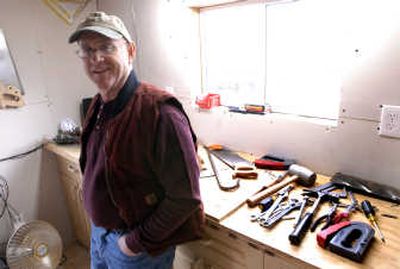Neighbors appreciate ‘Mr. Fix-it’

If there is one guy in the Highland Estates area west of Otis Orchards who might have the right tool for just about any kind of home repair job, it is Les Portner. “Les is always busy doing projects,” said neighbor Pat Bliss. “He must have one of every tool in the world. Whenever we need something we just run across the street and borrow it.”
A longtime “Mr. Fix-it,” Portner, 59, has accumulated quite a few tools over the years.
“We have a number of younger couples in this neighborhood,” Portner said. “I hate to see them go out and buy an expensive tool for one project, especially when I already own it.”
Portner, a retired East Valley School District superintendent, and his wife Debbie, an early childhood literacy coach, moved into their split-level rancher about nine years ago.
Pat Bliss and her husband, Ken, moved in soon after.
“Les and Debbie were very friendly and helpful from the start,” said Ken Bliss, 40.
Over the years the Blisses have borrowed “quite a few things” including short and long ladders, wrenches to fix the kitchen sink, various painting supplies and an air compressor nail gun to put up door trim.
“I don’t have a lot of carpentry experience,” said Ken Bliss, a registered nurse in the Valley Hospital Intensive Care Unit. “Les is very knowledgeable.”
“Often when we are doing a project,” said Pat Bliss, a speech therapist for St. Luke’s Rehabilitation Institute, “Les will give us a hand and help us out.”
For Portner, helping others is in his genes.
He grew up in a small logging community in south-central Washington near the Columbia River.
“We lived just outside of White Salmon in a little area called Pucker Huddle,” said Portner.
It seems Pucker Huddle, according to Portner, got its name in the early 1900s because that was the place where all the young people would go to “pucker and huddle.”
“My dad was always called Pucker Huddle Pete,” said Portner. “If people needed something fixed they would go see Pucker Huddle Pete.”
Primarily a logger, Pete Portner was also a skilled mechanic and builder who taught his son by example, working side-by-side with him on projects of all kinds.
“He probably cringed a lot,” smiled Portner. “Dad was a tough old guy from the woods, but underneath he was a very loving, caring fellow who would always be there to help people out.”
Sometimes young Portner would ask his father why he was doing something for someone else when he had so many other things he had to do.
Portner said his father turned to him and said: “Well this person needs some help right now and someday I may need some help and someone will come help me.”
Portner never forgot his father’s philosophy of paying favors ahead.
“There is a theme on the Rocky Mountain Elk Foundation that is called ‘Pass it on.’ Modifying that, my Dad always said to help someone and ask them to pass that help on to someone else,” said Portner.
“That all helps to form a strong base within our community of people helping people,” he said. “We have had many wonderful examples of that in this neighborhood.”